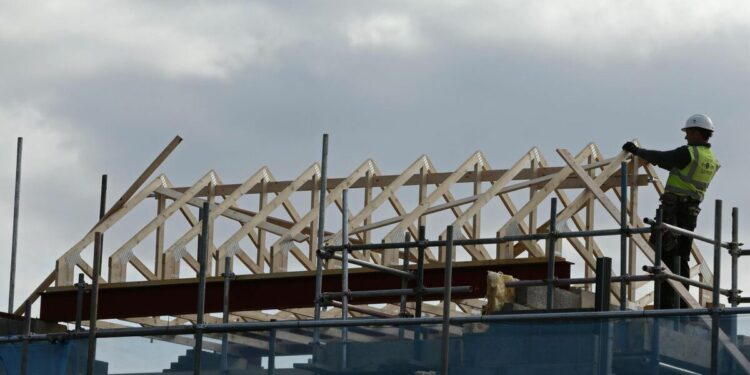Across Europe, slow economic growth is causing major headaches, with tax hikes across France and the UK aimed at combatting stagnation while Germany struggles with growing unemployment and a self-imposed debt brake.
Yet, Ireland has more money than ever before and despite serious infrastructure gaps, cannot spend it.
Being a high-income country remains a relatively new phenomenon for Ireland. Throughout the 1980s, the State’s debt-to-GDP ratio reached 130%, similar to what Greece and Italy ran during the financial crisis, while its current account deficit topped 15%. Meanwhile, unemployment reached 16.3% in the latter part of the decade, higher than it ever reached in the aftermath of 2008.
Not until the mid-90s did things pick up, with rapid advancements in growth leading to the Celtic Tiger era, fuelling access to cheap borrowing and excessive spending, ultimately bringing the economy to its knees come 2007.
The fallout from the financial crisis continues to haunt Ireland to this day, with strict commitments not to use windfall corporation tax receipts to fund permanent or recurring expenditure. At the same time, Ireland continues to struggle with significant infrastructure deficits in key areas such as housing, health, energy and transport. While Ireland is a very rich country, it fails to behave like one.
“There’s definitely a legacy effect to all of this,” says Niall Conroy, senior economist at the Irish Fiscal Advisory Council (Ifac).
Speaking to the Irish Examiner about a report this week published by the fiscal watchdog, Mr Conroy said that gaps in infrastructure are largely impacted by the State’s newfound wealth, noting; “Ireland has not always been high-income, leading to other countries having a head start.”
The report found that housing remains a “big challenge”, with the State having a historically low level of infrastructure. According to the watchdog, the gap between Ireland and other higher-income countries in Europe is 25% per person. However, Ifac noted that this has narrowed from 47% per person in 1995.
“A big part of the housing story, where our biggest deficit is, seems to be a legacy of the financial crisis,” said Mr Conroy.
“After 2008, a lot of construction firms went bust, with many workers emigrating as a result. There was very little capacity left to build houses, with Ireland still trying to build that capacity up to build homes in the intervening years.”
The report also found that the gap between health spending in Ireland and other high-income countries remains large at 53% despite recent hikes in investment, with the shortfalls consisting of buildings and structures.
Meanwhile, the gap between transport spending was 41%, with the gap between electricity spending at 26%.
In its report, Ifac noted that while some additional government investment may be required, the amounts that are required are modest relative to overall government spending, highlighting another key issue that the Government has struggled with in the post-financial crisis era.
“The Government should look to get better value for money on its investments,” says Mr Conroy.
“If you look at public investment and compare it to other European countries, we are a little bit higher. Are we getting good value for that? Is Ireland getting a lot of capital and infrastructure projects for the amount of money that it’s spending?
“We’re spending a lot in areas like housing. Maybe we could do more to examine or audit our existing expenditure to see what parts are effective and which are not. One thing that could help this is reforming the planning system.”
According to the publication, Ireland’s planning and objection system remains one of the biggest barriers to delivering infrastructure projects, with its “slow and unpredictable” nature increasing costs and delaying the country’s infrastructure needs.
“Reforming the planning system is something that not only enables the private sector to build houses by also helps the public sector to deliver these projects on time and within budget,” Mr Conroy said.
The report stressed that reforms to the system will be “essential” to addressing Ireland’s infrastructure deficits, adding that “time will tell if the new Planning and Development Act will bear fruit”.
Ifac found that almost 80,000 additional workers may be needed to combat infrastructure deficits
Given the scale of Ireland’s infrastructure deficits and challenges, the watchdog said that these cannot be addressed in a single year, stressing that long-term, multi-year planning is needed to address these issues.
This sentiment has been echoed by Hubert Fitzpatrick, director general of the Construction Industry Federation who, responding to the report, stressed that capital budgets “need to be spent with clear timelines and commitment to delivery”.
“The construction industry has the capacity to deliver on Ireland’s infrastructure and housing needs but must have certainty on a pipeline of new work in order to invest in and scale up resources. Uncertainty around investment and delivery timelines in public projects has a detrimental effect on the ability of contractors to retain talent and plan resources,” Mr Fitzpatrick added.
To combat this deficit, Ifac found that almost 80,000 additional workers may be needed, with this figure needed to build new housing and retrofitting existing homes.
However, it noted that a rise in productivity in the construction sector and a movement of workers could see this figure reduced to less than 20,000.
The watchdog said that construction productivity in Ireland remains 32% lower than the average. Compared to a country like Norway which is at the frontier, productivity in Ireland is less than half of that level.
“If productivity improved greatly, then house building could increase substantially without additional workers,” Ifac said. “This could help address a key issue for the Irish economy and society.”
Source link : http://www.bing.com/news/apiclick.aspx?ref=FexRss&aid=&tid=672590ec0a0e426d8307f37006e42244&url=https%3A%2F%2Fwww.irishexaminer.com%2Fbusiness%2Feconomy%2Farid-41507996.html&c=14752072841197019151&mkt=de-de
Author :
Publish date : 2024-11-01 18:05:00
Copyright for syndicated content belongs to the linked Source.


